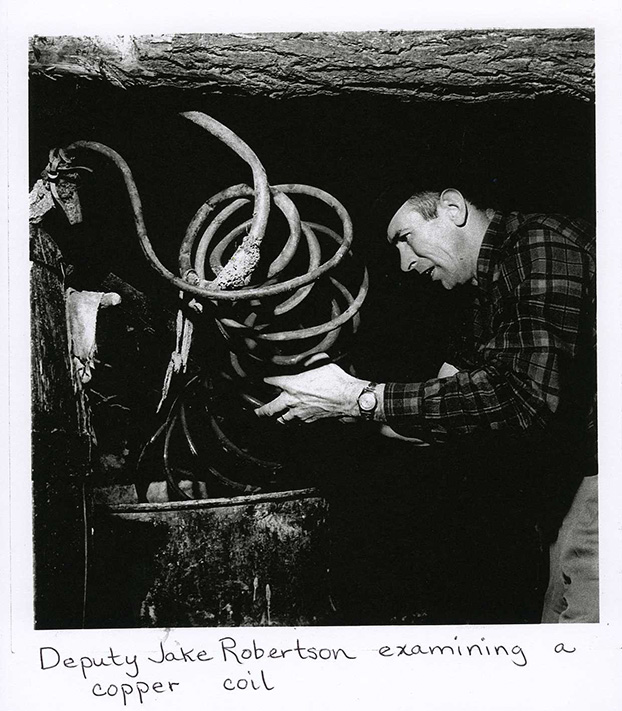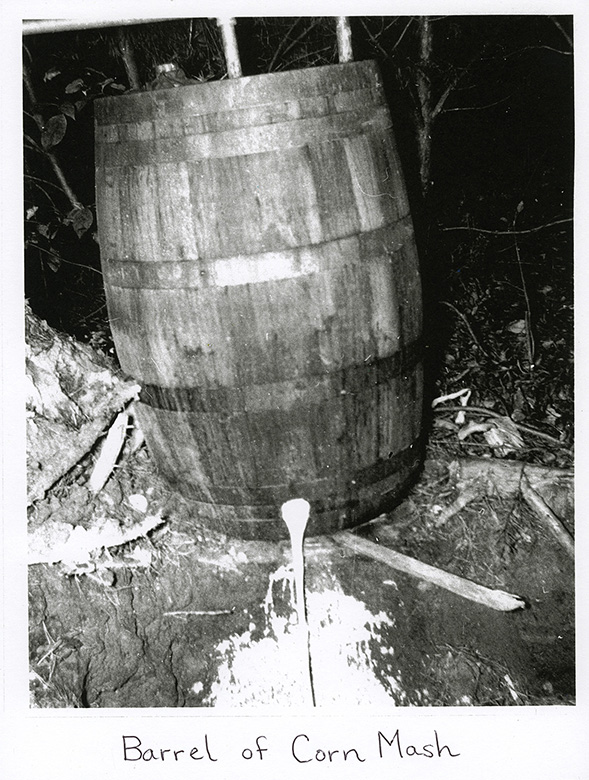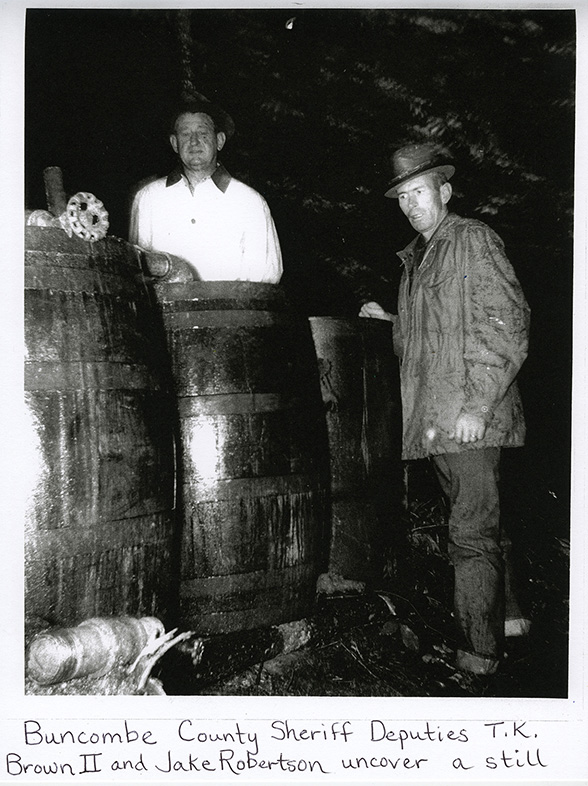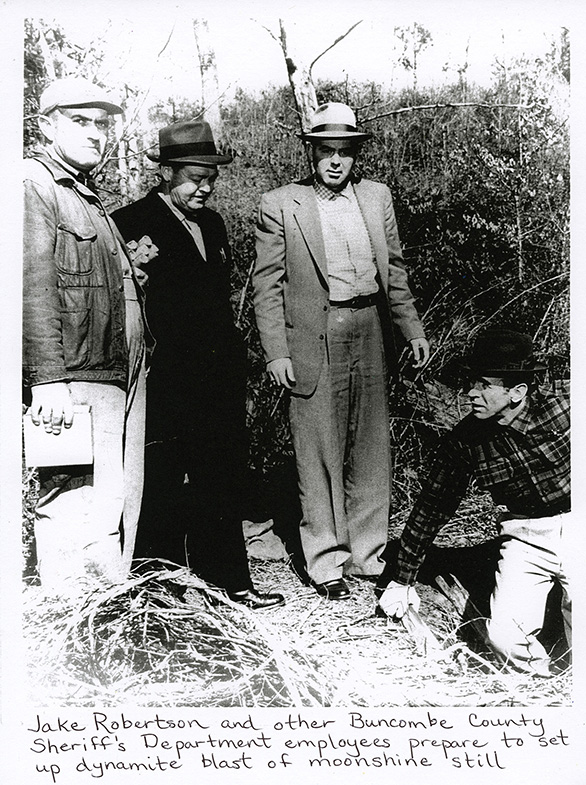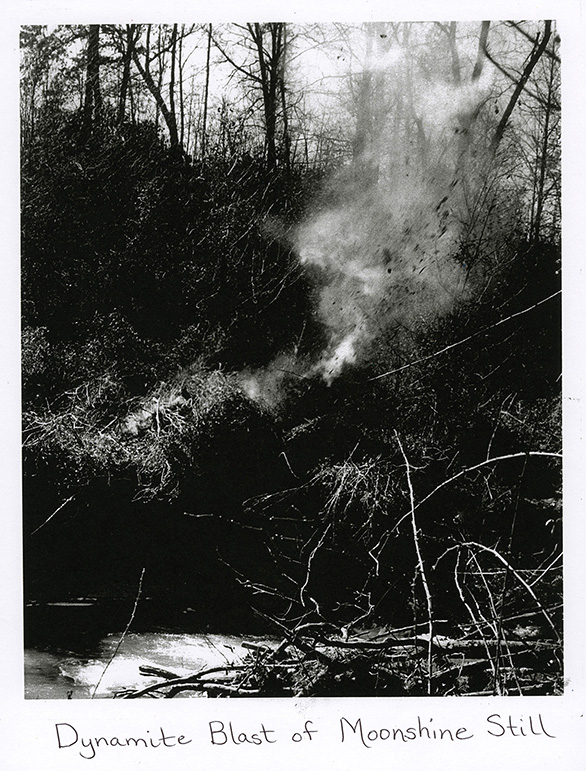RUGGED AS A LAUREL THICKET:
LAURENCE E. BROWN (1895-1965)
Served as High Sheriff for 34 Years
“Laurence Brown just naturally looks like a sheriff. He’s tall and straight as a mountain pine, rugged as a laurel thicket, with a face as stern and unyielding as chiseled granite, broken by bushy brows. His eyes burn beneath a shock of white hair. No matter how tall you are, you get the feeling he is looking down on you. It’s inconceivable that Laurence Brown could have been anything but a sheriff.”
– Asheville Citizen reporter Harold Hammond, 1963
“They [the Browns] used to have a liquor still up on the mountain. You break up the ones you don’t own. And when your brother owns the [filling station] you can sell it down there.”
– Bill MacMahan
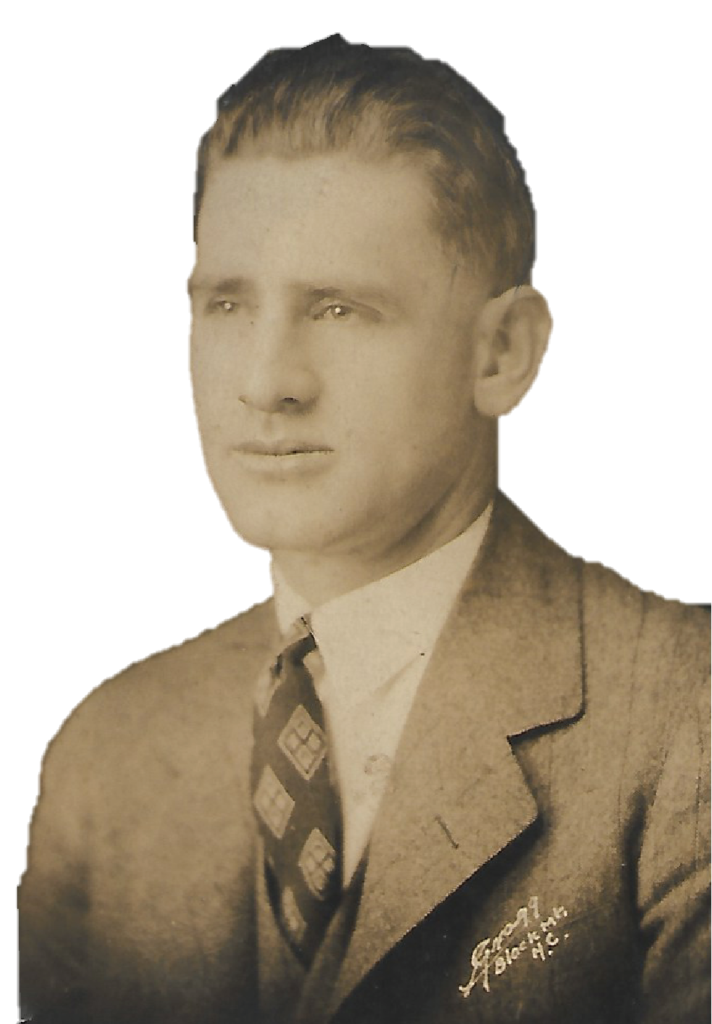
Born in 1895 in Black Mountain, Brown was the son of the town’s first mayor–who was also the minister at the local Baptist church.
Both Laurence and his younger brother, Carey, played football in college. But when Carey was paralyzed during a scrimmage in 1923 and died five days later, Laurence hung up his leather helmet, gave up his dream of becoming a lawyer, moved back home, and turned his sights towards law enforcement.
The World War I veteran, who completed his service as a sergeant first class in the U.S. Army, joined the Buncombe County Sheriff’s Department in 1924 as a deputy under Sheriff E.M. Mitchell. Two years later, Laurence would run against Mitchell in the Democratic primary election for Sheriff.
From the beginning of his tenure as Sheriff in 1926, Brown waged a war against bootleggers, rum runners, and moonshiners across the county, busting up stills and destroying the livelihoods of many a mountain brewer. By the end of his first full week in office, Brown and his deputies had confiscated 250 gallons of liquor.


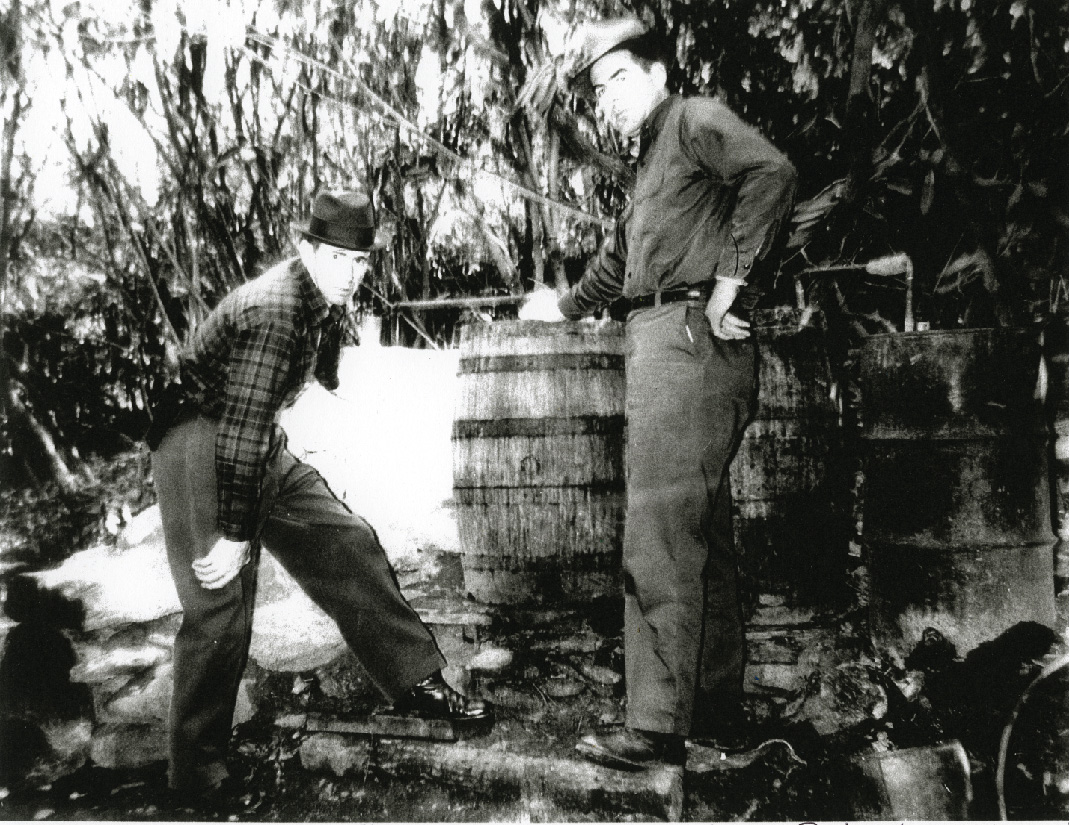
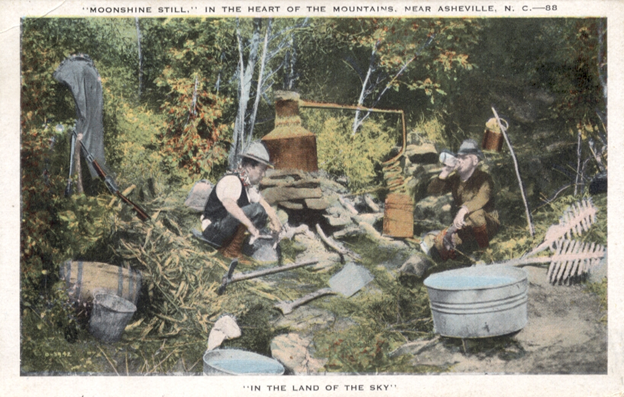
The making of moonshine in Appalachia dates back to the early 1700s, when Scots-Irish immigrants arrived in the region with knowledge of liquor distilling. Liquor served as an important ingredient for medicine in rural areas, and turning corn into moonshine also created a product that was easier to transport to market. In 1894, Congress increased the whiskey tax, causing many law-abiding distillers to sell their product illegally so they could continue making a profit. A little over a decade later, in 1909, North Carolina became a Prohibition State, and many in law enforcement- such as Sheriff Brown- came down hard on moonshiners and bootleggers.
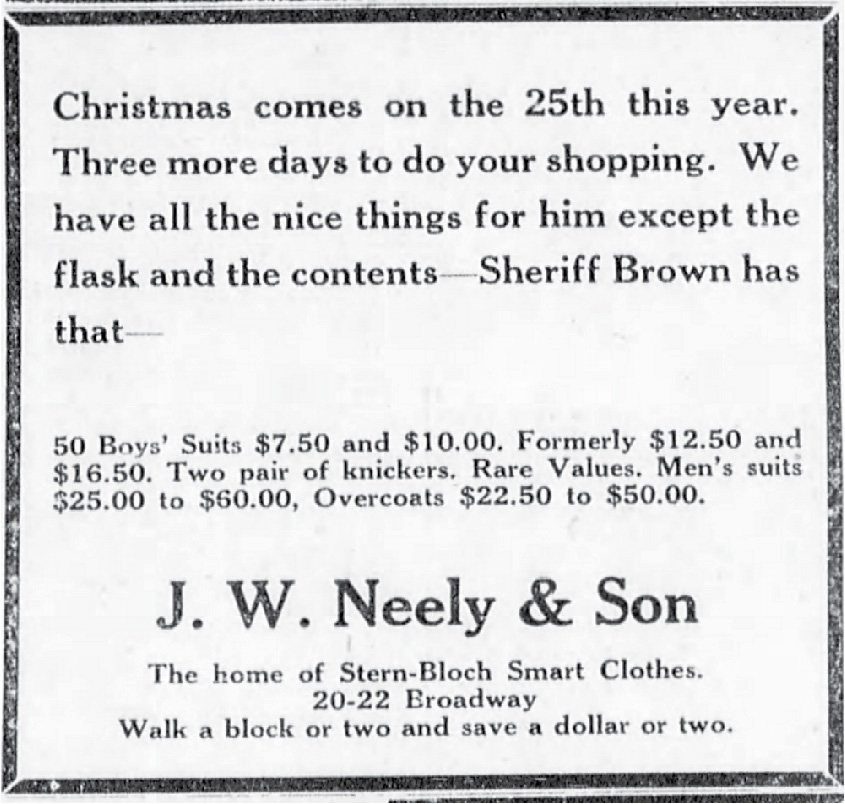
By July 1927, the regular storage room at the county courthouse was filled with “countless bottles, fruit jars, jugs, cans, kegs, and barrels stacked in congested confusion… and has long since made the sheriff’s private office a place of rank
atmosphere with the odor of sour sugar liquor.” (Asheville Citizen, 07/24/1927)
Left: From the Asheville Citizen, December 22, 1926
The photos in the gallery below depict Sheriff Brown’s deputies locating, busting, and dynamiting a still. All photos courtesy of Sherry Osteen.
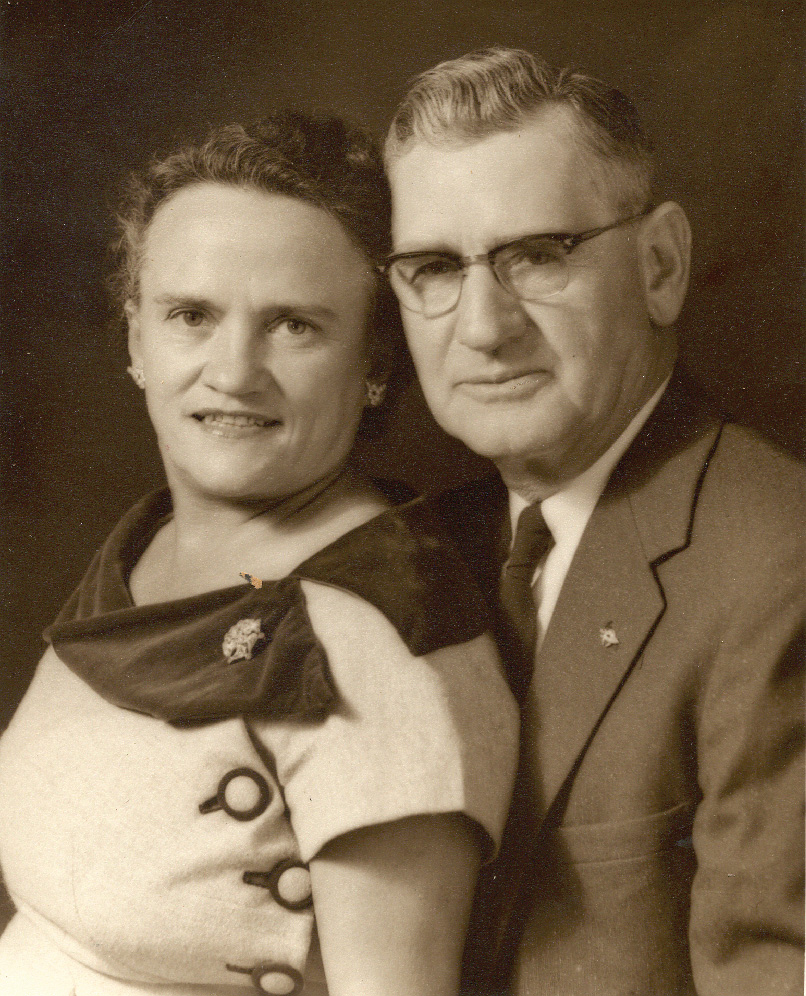
In 1928, though Brown easily won the primary, for the first time in 32 years, Democrats lost almost every elected position in Buncombe County, including Sheriff. Brown went home to Black Mountain and for the next two years chased down liquor-laden automobiles in the small town as Chief of Police until he could run for Sheriff again in 1930. This time he would not be defeated. Nor would he be defeated again for the next 16 elections; all told, Laurence E. Brown served as High Sheriff of Buncombe County for 34 years.
Left: Willa and Laurence Brown
Stories about moonshining, bootlegging, and efforts to enforce Prohibition abound in the Swannanoa Valley, many passed through oral tradition. Below, read stories about moonshine related by valley residents.
Geyser Still
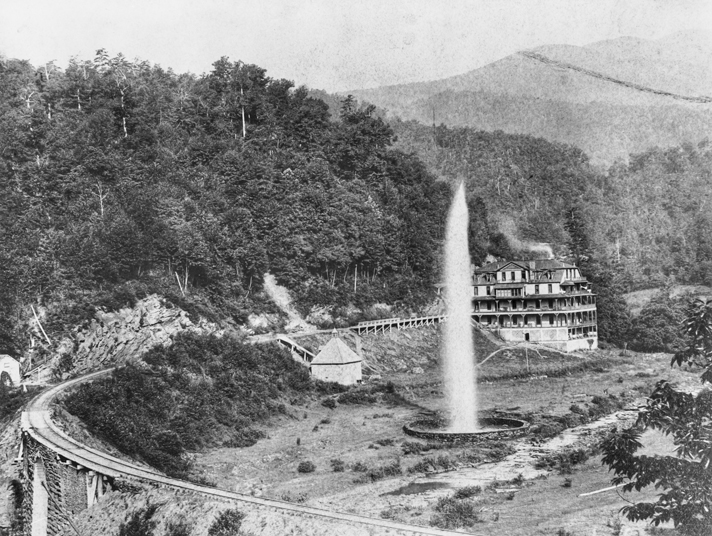
John, a respected plumber in Black Mountain was hired by Southern Railway to restore Andrew’s Geyser in Old Fort. John would load up his truck, go down the mountain to the geyser site, carry his tools and supplies up in the woods and work restoring the water tank. One day John noticed a helicopter that kept circling overhead. He decided some hiker was lost and kept on with his job. The following day when he returned to his work site he found four federal officers waiting for him with drawn guns. Because John was carrying rolls of copper pipe they thought he was setting up a still. Everything was explained and John finished the geyser.
Right: Andrews Geyser and Round Knob Lodge, ca. 1890s. Courtesy of North Carolina Collection, University of North Carolina at Chapel Hill Library.
That Good Mountain Water
My grandmother would come and stay three months at a time with us. She liked the country and the gardens. Loved canning and she loved company. Every time company came she’d say, “Have some of this good mountain water.” She had grown up in west Tennessee where sulfur water was the main thing and it was awful. Even when her preacher from Tennessee came over to see her she told him about the good mountain water. Finally, my husband said to her, “Grandmother, the reason that water is so good is because the moonshiners empty their barrels of mash into the creek.” She was horrified.
Buncombe County Junior Deputies
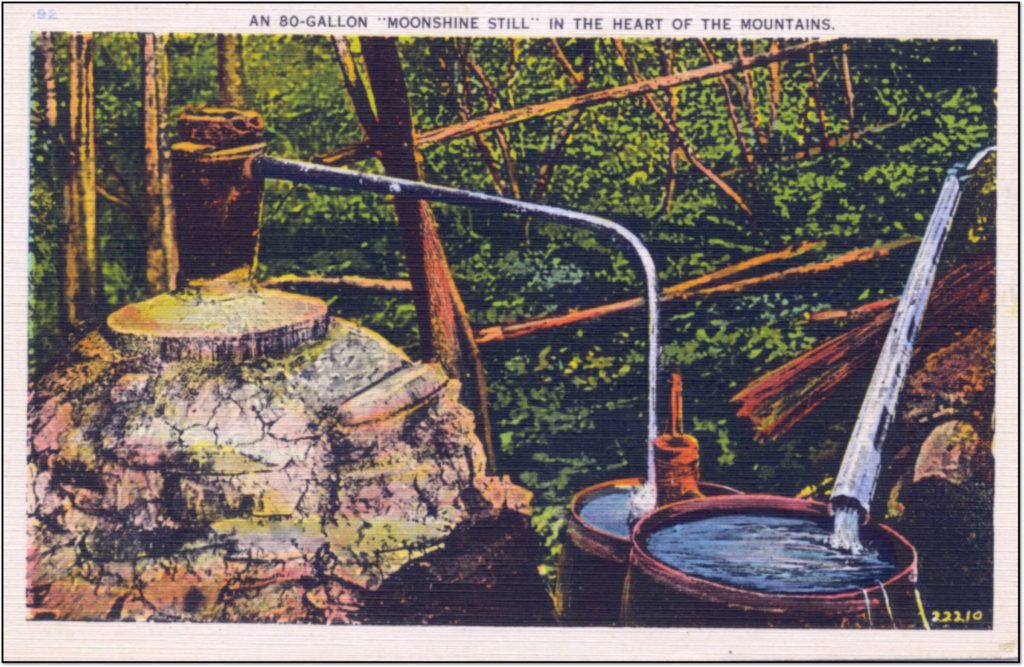
On a Boy Scout campout, one boy dropped his hatchet up in Montreat. On Sunday, two boys went back up there for it and found a still. The Sheriff, Laurence Brown, had established a club for boys called Junior Deputies and these boys were members, so they reported the still. The sheriff’s department knew the still was there all along, but the moonshiners were friendly folk, so they just overlooked it. Now that the boys had reported it, they had to take it in. So they very carefully moved everything to another site and told them where it was. They never did get arrested for it, but the boys were satisfied that they had done a good job.
Celebrating with a Drink
I helped my old man make some moonshine, down there off Broad River. So we went one evening in 1967 and we loaded it up in his little blue Mustang. We loaded that thing down. Here we come back up Route 9. Well, we come around the curve and there they had a big road block. License check. When I saw it I grabbed the door handle and he grabbed me and he said, “No, you don’t. You going to sit right here with me.” I was ready to run. We got up there and they checked the license. They said, “That will be fine.” They let us go. A little further up the road, we stopped and celebrated and took us a big drink.
Guineas
Everybody that made liquor had guineas. If anyone sneaks around, the guineas would see and they’d holler. Grandpa got him some guinea eggs. He raised them until they was grown. One evening he was sitting out there on the porch and on the other side of the railroad track there was a bank and every one of them guineas, there was about 25, was up on that bank. Here comes an old coal car going slow. And one of them guineas flew up on top of the coal and all of them did and Grandpa sat there and watched them all ride away.
Bottomless Cups
There was a big pig picking down Route 9. There were hundreds of people and I had two gallons of moonshine. We had been there all evening and these two boys come up to me. They said, “Mister, we heard you had some moonshine.” I said “Yeah.” They said, “We ain’t never drunk no moonshine. Can we drink some moonshine?” I said, “Why, yeah.” They said, “We’ll be back. We’ll get us some cups.” I thought, “Cups? Why don’t you just drink it out of the jug?” Here they come back and they had little Styrofoam cups. I was sitting there and I just took that liquor and put it in the Styrofoam cups. They pick them cups up and they look through them. It ate the bottoms out of the cups.
